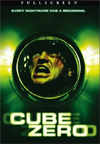Cube Zero
Lions Gate Home Entertainment
Cast:
Extras: Commentary Track, Featurette, Music Video, Storyboards, Trailers
Rating:
If you’ve followed the series this far, you know the basic premise: a group of strangers wake up in a series of connected, cube-shaped rooms, all of which appear to be identical. To make things interesting, some of the rooms are equipped with nasty traps that leave their victims scorched, decapitated, eviscerated, or in some other unpleasant state. At least the cubies we’ve seen before were given a mathematical code which held the key to avoiding these traps; the victims in this prequel, the franchise’s third installment, aren’t quite so lucky. This serves as only one of several ways that "Cube Zero" expands on its predecessors while still maintaining the unique blend of theoretical, mathematically oriented puzzles and visceral horror that made the earlier films so compelling.
All of the action in the first two "Cube" films took place inside the cube, with only a few hints of the massive bureaucracy that created this experimental construct. In "Cube Zero," we finally get a glimpse outside of the cube through the eyes of two low-level workers in an observation room, who know almost nothing beyond the day-to-day requirements of the job. We’re given bits and pieces of the cube’s history and have some of the hypotheses from the earlier films confirmed, but the film still ends with even more questions than it started with.
Several other innovations distinguish this film from the previous two. The cube itself has a very different look to it, with a design that features more metal and less light, giving the film an overall grimier feel to it – in both the featurette and <$commentary,audio commentary> included on the disc, director Ernie Barbarash cites films like "Brazil" and "City of Lost Children" as influences on the production design. In addition, fans of the series will notice that the gore’s been kicked up several notches, with a few death sequences looking like they could have come out of a Lucio Fulci movie in the way they linger on bodies falling apart. Some genre fans are sure to be tickled by these scenes; others are likely to find them a bit too extreme.
But even with these differences, it’s still easily identifiable as another "Cube" film. The claustrophobic atmosphere serves as a powerful backdrop for theories about the nature of power, mind-bending puzzles, and steadily mounting tension. It all adds up to that rare film that inspires thought at the same time it delivers the thrills.
Lions Gate’s disc features an <$16x9,anamorphic> <$PS,widescreen> transfer that’s a bit grainy, but still manages to maintain a reasonable level of detail and rich black levels. There aren’t a whole lot of colors in the film, but the dark greens and blues come through nicely. However, the soundtrack is by far the disc’s most outstanding feature. The Dolby 5.1 track is an extremely aggressive mix, with clicks and whirs coursing through the rear channels to heighten the sense of paranoia. Placement is excellent throughout, and some strong panning effects keep the soundstage active. All in all, this is one of those soundtracks that makes you remember why you bought a surround sound system in the first place.
The extra features are adequate, but not particularly inspired. A 20-minute featurette starts things off, which features most of the cast and crew. Writer/director Ernie Barbarash provides a solid audio <$commentary,commentary track>, in which he discusses both the technical aspects of making the film and some of the thematic concerns he was trying to address. The set finishes off with a music video, storyboard comparisons for two of the death sequences, a few production sketches, and trailers for other Lions Gate films. All of the extras are either <$PS,full frame> or non-<$16x9,anamorphic> <$PS,widescreen>.
All in all, this makes for a disc that’s worthy of its predecessors. The "Cube" franchise is quickly becoming one of the most intelligent sci-fi/horror series to ever hit the shelves of your video store, and while nothing could compare to the brilliant surprises of the first film, "Cube Zero" shows there’s still some room to build.







